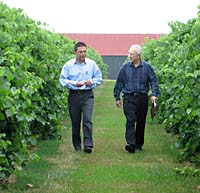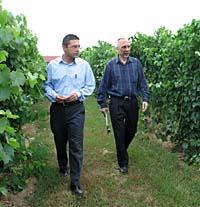UK College of Ag Experts Work with Vineyards, Wineries to Advance Grape Industry in Kentucky
UK College of Ag Experts Work with Vineyards, Wineries to Advance Grape Industry in Kentucky



Talon winemaker John Pitcock checks on his Cabernet Sauvignon.
Back in the 1800s, Kentucky was the third largest grape and wine producer in the United States. When prohibition hit, the fruit’s popularity dwindled. In recent years, however, grapes have been making a comeback to the rolling hills of the commonwealth with more than 250 acres devoted to the alternative crop so far.
To help in this effort, the University of Kentucky College of Agriculture hired two specialists specifically to tackle the unique challenges of grapes. Viticulturist Kaan Kurtural and Enologist Tom Cottrell have been busy visiting the many small Kentucky vineyards and wineries to determine their needs and share their knowledge and experience.
“When I came down here to interview, we came down through southern Illinois and we drove up on the Bluegrass Parkway,” Kurtural recalled. “As I was driving, there were all these gently rolling hills, which are what we look for in grape grounds. There’s a tremendous opportunity in Kentucky because we do have the suitable climate and the sites where we can plant these varieties to grow, but what we need to do is get the growers on board with the prospect to make it an economical enterprise.”
In addition to traveling to the state’s vineyards and wineries, Kurtural has been working directly with Talon Vineyard and Winery in Fayette County where he is about to harvest “Traminette” grapes in a study investigating how much cropload, or quantity, can be increased without reducing quality under the Kentucky climate. The grapes will be taken to UK’s South Farm where Cottrell will turn them into wine.
“I look at my job as an opportunity to share with the Kentucky wineries the easy and best ways to make consistently good wine,” said Cottrell, who has spent many years working with wineries around the United States, including several in Napa Valley, Calif. “I have been meeting with as many of the wineries as I can and giving them presentations on what small wineries need here, and their needs are pretty much the same as small wineries around the country.
Talon winemaker John Pitcock appreciates the knowledge and recommendations of Cottrell and Kurtural. Although still a young winery, Talon has won some impressive awards for its wines. Pitcock said the future for Kentucky vineyards and wineries looks promising.
“I think it has a great future in this state and I think as long as the wineries prosper, it’s also very good for the farmers out there who have switched from tobacco to grapes trying to keep the family farm,” he said. “That’s one reason we don’t try to grow all our grapes here is because we do want to support that effort.”
Pitcock said Talon buys grapes from five other Kentucky vineyards, and he hopes to expand that in the future.
“Part of the value of Kentucky grapes is that we can grow good quality here, but the other part is that it’s Kentucky product and that’s what we’re selling in the agritourism business,” he said. “Plus to a large number of consumers, Kentucky is a state in which people are very proud of what we do here; and rightfully so, we do many things just as good as anybody else in the world and I think a Kentucky-grown product is going to be what really drives the industry.”
The 2005 drought hasn’t played a significant role in the grape growing season. Kurtural said grapes need about 36 inches of precipitation to thrive, and Kentucky averages around 45 inches per year. Even though many areas are several inches shy of normal rainfall this year, he said he doesn’t expect it to hurt harvest yields.
“We had rain early in the year,” he said. “Going into harvest, we want it to be a little dry as that helps the grape’s sugar-to-acid ratio reach its potential.”
Kurtural and Cottrell emphasized that anyone getting into the grape business should start small. They say it’s not a quick money-maker and usually takes at least three years to break even. Still, they agree that Kentucky has the right ingredients to be successful and competitive in the industry.
“The long-term outlook is great for Kentucky because we do have the climate and the sites,” Kurtural said. “We just need to plant at these sites with the recommendations that we give out.”
Cottrell advised anyone starting out in the grape business to study the site and take the fall, winter and spring weather conditions into consideration before planting.
“Kentucky can be ‘blessed’ all three seasons,” he said.